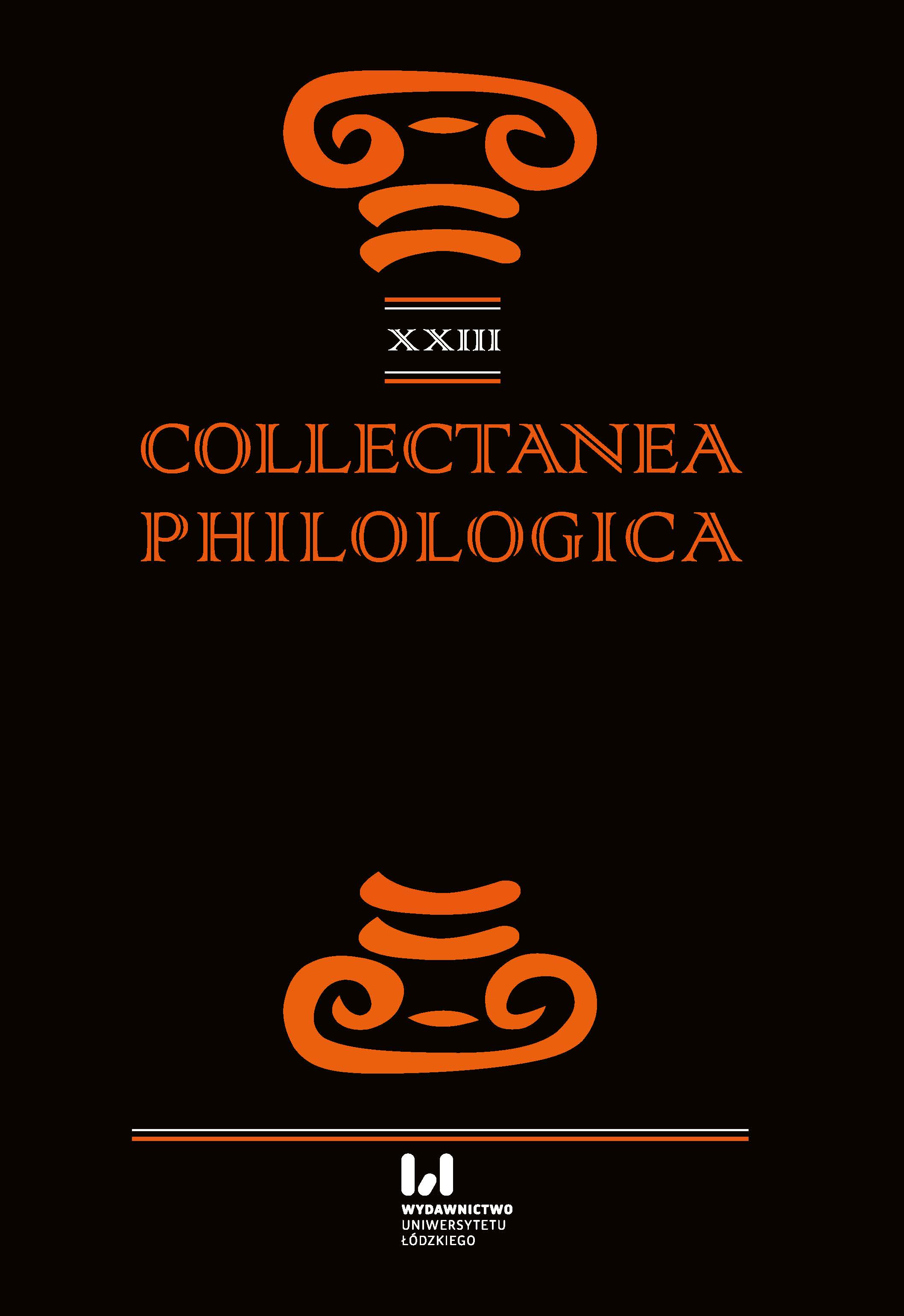O pewnym ślubnym zwyczaju w relacji Marka Terencjusza Warrona
DOI:
https://doi.org/10.18778/1733-0319.23.07Słowa kluczowe:
Varro, marriage, Roman religion, Lares, Roman coinageAbstrakt
This article focuses on a certain wedding custom presented by the ancient Roman scholar, Marcus Terentius Varro in his work De vita populi Romani. According to him Roman bride on her way to her new home used to carry three coins, and to dedicate them to her husband, to Household Lares and to Compital Lares.
Bibliografia
Albrecht von, M. (1997). A History of Roman Literature. From Livius Andronicus to Boethius, vol. I. Leiden–New York–Köln: E. Brill.
Google Scholar
DOI: https://doi.org/10.1163/9789004329904
Awianowicz, B.B. (2010). Monety Republiki Rzymskiej. Kompendium. Toruń: Wydawnictwo Literat.
Google Scholar
Beard, M. et al (2017). Religie Rzymu. Historia. Tłumaczenie zbiorowe pod red. M.J. Baranowskiego i L. Olszewskiego. Oświęcim: Napoleon V. (Oryginał: Beard M. et al [1998]. Religions of Rome. History. Cambridge: Cambridge University Press).
Google Scholar
Benincasa, Z. (2013). „Deductio in domum mariti a zawarcie iustum matrimonium”. Zeszyty Prawnicze 13 (2). 7–25.
Google Scholar
DOI: https://doi.org/10.21697/zp.2013.13.2.01
Boyce, G. (1937). Corpus of the Lararia of Pompeii. Memoirs of the American Academy in Rome 14. Rome: University of Michigan Press.
Google Scholar
DOI: https://doi.org/10.2307/4238593
Clarke, J.R. (2003). Art in the Lives of Ordinary Romans. Visual Representation and Non-Elite Viewers in Italy 100 B.C.–A.D. 315. Berkeley–Los Angeles–London: University of California Press.
Google Scholar
Cornell, T., Bispham, E. (red.) (2013). The Fragments of the Roman Historians, t. 1. Oxford: Oxford University Press.
Google Scholar
DOI: https://doi.org/10.1093/actrade/9780199277049.book.1
Depeyrot, G. (2006). La Monnaie romaine. 211 av. J.-C.–476 apr. J.-C. Paris: Éditions Errance.
Google Scholar
Flower, H.J. (2017). The Dancing Lares and the Serpent in the Garden. Religion at the Roman Street Corner. Princeton University Press.
Google Scholar
DOI: https://doi.org/10.23943/princeton/9780691175003.001.0001
Follette la, L. (2001). The Costume of the Roman Bride. W: Sebesta, J.L., Bonfante, L (red.). The World of Roman Costume. Madison: University of Wisconsin Press.
Google Scholar
Fröhlich, T. (1991). Lararien- und Fassadenbilder in den Vesuvstädten, Untersuchungen zur „volkstümlichen” pomejanischen Malerei. Mainz: Philipp von Zabern.
Google Scholar
Giacobello, F. (2008). Larari pompeiani. Iconografia e culto dei Lari in ambito domestico. Milano: Università degli studi di Milano.
Google Scholar
Glare, P.G.W. (1968). Oxford Latin Dictionary. Oxford: Clarendon Press.
Google Scholar
Hersch, K.K. (2010). The Roman wedding. Ritual and Meaning in Antiquity. Cambridge: Cambridge University Press.
Google Scholar
DOI: https://doi.org/10.1017/CBO9780511762086
Kaczor, I. (2012). Deus. Ritus. Cultus. Studium na temat charakteru religii starożytnych Rzymian. Łódź: Wydawnictwo Uniwersytetu Łódzkiego.
Google Scholar
Kaczor, I. (2015) „Ofiary z ludzi w obrzędowości rzymskiej – Mamuralia, Sacra Argeorum, Saturnalia, Kompitalia”. Collectanea Philologica 18. 53–64.
Google Scholar
DOI: https://doi.org/10.18778/1733-0319.18.05
Katon (2009). Marek Porcjusz Katon. O gospodarstwie rolnym, z jęz. łac. przełożył, wstępem i komentarzem opatrzył: I. Mikołajczyk. Toruń: Wydawnictwo Naukowe Uniwersytetu Mikołaja Kopernika.
Google Scholar
Korpanty, J. (red.) (2001). Słownik łacińsko-polski, t. I–II. Warszawa: Wydawnictwo Szkolne PWN.
Google Scholar
Krzyszowska, A. (2003). Les cultes privés a Pompéi. Wrocław: Wydawnictwo Uniwersytetu Wrocławskiego.
Google Scholar
Kumaniecki, K. (1977). Literatura rzymska. Okres cyceroński. Warszawa: Państwowe Wydawnictwo Naukowe.
Google Scholar
Lind, G. (2008). Common Law Marriage. A Legal Institution for Cohabitations. Oxford: Oxford University Press.
Google Scholar
DOI: https://doi.org/10.1093/acprof:oso/9780195366815.001.0001
Linderski, J. (1984). „Usu, farre, coemptione. Bemerkungen zur Überlieferung eines Rechtsatzes“. Zeitschrift Der Savigny-Stiftung Für Rechtsgeschichte. Romanistische Abteilung 101 (1). 301–311.
Google Scholar
DOI: https://doi.org/10.7767/zrgra.1984.101.1.301
Lott, J.B. (2004). The Neighborhoods of Augustan Rome. Cambridge: Cambridge University Press.
Google Scholar
Marshall, F.H. (19213). A Companion to Latin Studies. Red. by John Edwyn Sandys. Cambridge: Cambridge University Press.
Google Scholar
Modestinus (2014). Digesta Iustiniani, Digesta Justyniańskie, IV, ks. 20–27. Tekst, przekład pod red. T. Palmirskiego, praca zespołowa (K. Hilman, M. Hładyszewska, T. Palmirski, J. Reszczyński, H. Wolanin), przy współpracy P. Niczyporuka (ks. 25, 26). Kraków: Poligrafia Salezjańska.
Google Scholar
Mommsen, T. (red.) (1872). Corpus iuris civilis. Vol. 1. Iustiniani digesta. Berolini: apud Weidmannos.
Google Scholar
Myśliwiec, H. (1990). Varro, Marcus Terentius. W: Świdarkówna, A. (red.). Słownik pisarzy antycznych. Warszawa: Wiedza Powszechna. 470–472.
Google Scholar
Nonius, M. (1903). De compendiosa doctrina libri XX. W: Lindsay W.M., t. I–III. Lipsiae: B.G. Teubner.
Google Scholar
Plaut (2003). Komedie, tom II: Osły, Misa pełna złota. Przełożyła, wstępem i przypisami opatrzyła E. Skwara. Warszawa: Wydawnictwo Prószyński i S-ka.
Google Scholar
Plezia, M. (red.) (1959–1979). Słownik łacińsko-polski, t. I–V. Warszawa: Państwowe Wydawnictwo Naukowe.
Google Scholar
Rozwadowski, W. (1987). „Nowe badania nad istotą małżeństwa rzymskiego”. Meander 42 (4–5). 237–247.
Google Scholar
Schultz, C.E. (2006). Women religious activity in the Roman Republic. Chapel Hill: University of North Carolina Press.
Google Scholar
Stankiewicz, L. (1996a). „Małżeństwo w starożytnym Rzymie. Gdzie ty, Gajusz, tam ja, Gaja”, cz. 1, Kurier Plus 96/432, szp. 17, New York.
Google Scholar
Stankiewicz, L. (1996b). „Rozwód w starożytnym Rzymie. Gdzie ty, Gajusz, tam ja, Gaja”, cz. 2, Kurier Plus 97/432, szp. 12, New York.
Google Scholar
Szczygieł, S. (2011). Marek Porcjusz Katon – rzymski tradycjonalista czy polityk realista. Warszawa: Wydawnictwo DiG.
Google Scholar
Treggiari, S. (1991). Roman Marriage. Iusti Coniuges from the Time of Cicero to the Time of Ulpian. Oxford: Oxford University Press.
Google Scholar
Varro, M.T. (1939). M. Terenti Varronis De vita populi Romani. Fonti, Esegesi, Edizione Critica dei Frammenti. Red. Benedetto Riposati. Milan: Pubblicazione dell’ Università Cattolica del Sacro Cuore.
Google Scholar
Varro, M.T. (2004). M. Terenti Varronis Fragmenta omnia quae extant. Pars II. De vita populi Romani libri IV. Red. Marcello Salvadore. Hildesheim–Zurich–New York: Georg Olms.
Google Scholar
Wołodkiewicz, W., Zabłocka, M. (1996). Prawo rzymskie. Instytucje. Warszawa: C.H. Beck.
Google Scholar
Zabłocka, M. (1988). „Confarreatio w ustawodawstwie pierwszych cesarzy rzymskich”. Prawo Kanoniczne: kwartalnik prawno-historyczny 31 (1–2). 237–246.
Google Scholar
DOI: https://doi.org/10.21697/pk.1988.31.1-2.12
Pobrania
Opublikowane
Jak cytować
Numer
Dział
Licencja

Utwór dostępny jest na licencji Creative Commons Uznanie autorstwa – Użycie niekomercyjne – Bez utworów zależnych 4.0 Międzynarodowe.












